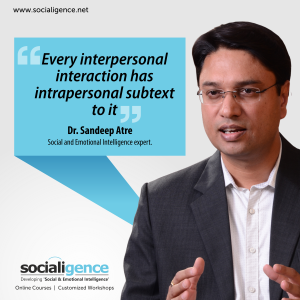
Whenever two persons interact, their respective psychological worlds subtly shape the mode, manner, progression and fate of their interpersonal interaction. Yes, people tend to discuss what happened between them without investigating what was happening inside them when something happened between them. It is true for all disagreements, confrontations, dissent, conflicts, and even vengeance & violence.
Have you ever realized that you tend to get upset relatively quickly when you are fatigued; or that you tend to disagree more with points of someone you dislike; or that you tend to align more often with someone who seems to share your value system or background! Well, that’s a reality. Our prejudices, complexes, motives, biases, experiences, perceptions, moods, all are inputs to an interpersonal interaction.
However, in the appeal and apparentness of what’s going on outside, today people lack the patience and temperament to see inside themselves. Most people are not cognizant of what is going on inside. In fact, you would be surprised that a fraction of population isn’t able to even differentiate between the feeling of hunger and thirst. They tend to eat when what they actually needed was hydration.
In the same vein, in fact, there are people who can’t even spot that they are getting edgy or anxious, most of whom are not able to understand the reason, and quite a few of them who can’t figure out what to do about it. And these intrapersonal dynamics play a significantly intervening role in interpersonal interactions.
For instance, when something goes wrong between two persons, often the reason lies, not between two of them, but inside each of them. Yes, whenever two persons connect, interact or relate, their own emotional states born out of their unique life circumstances play an influencing role. It’s high time that we bring the required emotional & social intelligence into play, and become more observant, attuned, and thus…sorted.
Dr. Sandeep Atre (Founder-Director, Socialigence)
